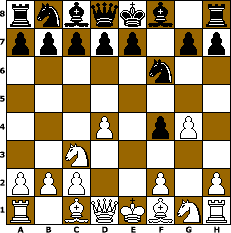Ksawery Tartakower (generally known as Saviely or Savielly in English, less often Xavier Tartacover or Xavier Tartakover; 1887–1956) was a leading Polish and French chess Grandmaster.
He was born February 22, 1887 in Rostov-on-Don, to a Polish Jewish family. At the age of twelve his family left Russia for Austria-Hungary and finally settled in Vienna, where Tartakower grew up. He graduated from the law faculties of the universities in Geneva and Vienna. During his studies he became interested in chess and started attending chess meetings in various cafés for chess players in Vienna. He met personally many notable masters of the time, among them Carl Schlechter, Geza Maroczy, Milan Vidmar and Richard Réti. His first achievement was the first place in a tournament in Nuremberg in 1906. Three years later he achieved the second place in the tournament in Vienna — losing only to Réti.
During World War I he was drafted to the Austro-Hungarian army and served as a staff officer on various posts. After the war he emigrated to France and settled in Paris. Although Tartakower did not even speak the Polish language, after Poland regained its independence in 1918 he accepted Polish citizenship and became one of the most prominent honorary ambassadors of Poland abroad.
In France he decided to become a profesional chess player. He also started cooperation with various chess-related magazines. He also wrote several books and brochures related to chess playing. The most famous of his books, the Hyper-modernist chess play (Die hypermoderne Schachpartie) was published in 1924 and has been issued in almost a hundred re-editions ever since. Tartakower took also part in many of the most important chess tournaments of the epoch. In 1927 and 1928 he won two tournaments in Hastings and shared the first place with Aron Nimzowitsch at the London contest. At the latter occasion he managed to beat as notable chess players as Frank Marshall, Milan Vidmar and Yefim Bogolubov. In 1930 he won the Liège tournament beating Mir Sultan Khan by two points. Further down the list were, among others, Akiba Rubinstein, Nimzowitsch and Marshall.

Tartakower opening
In the thirties Tartakower represented Poland in six chess olympiads, gathering three individual medals (gold in 1931 and bronze in 1933 and 1935), as well as 5 team medals (gold, two silver and two bronze). In 1935 he was one of the main organisers of the Chess Olympiad in Warsaw. He also won the Polish Chess Championship twice (1935 in Warsaw and in 1937 in Jurata).
In 1939 the outbreak of World War II caught him in Buenos Aires, where he was playing the 8th Chess Olympiad, representing Poland in a team with, among others, Mieczys³aw Najdorf. After a short stay in Argentina he decided to return to Europe. He arrived in France shortly before its collapse in 1940. Under a false name Cartier he joined the forces of general Charles de Gaulle. After World War II and the communist take-over of power in Poland, Tartakower became a French citizen. He represented France at the 1950 Chess Olympiad. FIDE instituted the title of International Grandmaster in 1950; Tartakower was in the first group of players to receive that title. He died on February 4, 1956, in Paris.
Tartakower is regarded as one of the most notable chess personalities of his times. A talented chess player, he is also known for his countless aphorisms, which are sometimes called Tartacoverisms. One of the variations of the Dutch Defence is named after him. The Tartakower Defence in the Queen´s Gambit Declined (also known as the Tartakower-Makogonov-Bondarevsky System) also bears his name. He is alleged to be the inventor of the ´Orangutan Opening´ 1.b4..., so named after Tartakower fell in love with a great ape during his visit to the zoo whilst playing in the great 1924 tournament in New York.
Quotations
- "It´s always better to sacrifice your opponent´s men."
- "An isolated Pawn spreads gloom all over the chessboard."
- "The blunders are all there on the board, waiting to be made."
- "The winner of the game is the player who makes the next-to-last mistake."
Writings of Savielly Tartakower
- 500 Master Games of Chess by Savielly Tartakower and J. du Mont (Dover Publications, June 1, 1975, ISBN 0486232085)
- Bréviaire des échecs, one of the best known initiation text for chess in the French language
|
